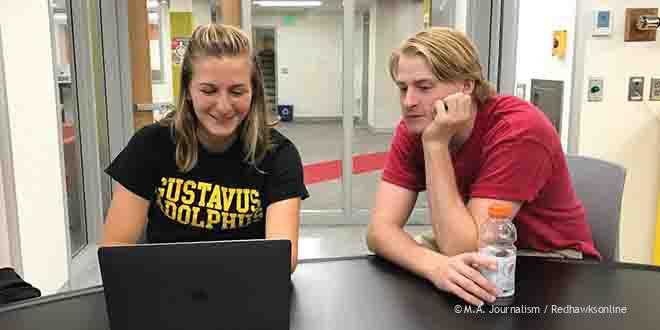Gender distribution differences in the labor force possibly affect seniors’ choices of intended majors
“Is this meal for a girl or a boy?”
You promptly reply to the speaker that the 4 piece McNugget Happy Meal is for your little brother. Within minutes, the ripped plastic package he got from his cardboard meal box is on the floor, and he’s driving his new Hot Wheels truck along the armrests of his car seat. Meanwhile, the little girl in the car behind you is combing the long blonde hair of the brand new Princess Peach doll she pulled out of her box.
From the type of toy a child is given, to the after-school activities parents find appropriate for their child, society consistently exhibits implicit gender bias. It is such actions that impact children’s opinions of the roles they feel they fit into within society.
As high school seniors begin to look for and discover their intended college majors, they are inevitably faced with societal influences about gender-dominated occupations.
According to a meta-analysis by Florida International University, males and females have different cognitive strengths and weaknesses. The study shows that boys generally perform better than girls do on tasks that require certain spatial orientation, visualization and quantitative skills. Meanwhile, girls typically outperform boys in tasks that require verbal, writing and memory skills.
These qualities have traditionally been translated into the perception that males thrive in occupations that include logical or quantitative tasks such as careers in economics and architecture, while females perform best in occupations that require person-to-person relationships and hospitable skills such as child and health care.
Senior Johnny Goth plans to major in nursing at the University of Minnesota Twin Cities this fall, an occupation represented by less than three percent of males.
“I’ve always been interested in the medical field and both my parents have worked in hospitals, so I’m familiar with that work setting,” Goth said.
“I like the flexibility nursing offers; throughout my career, I can choose to do psych, E.R. or pediatrics to name a few. I also love being around people. I’m an empathetic person who can relate to a lot of different types of people, and I like seeing people progress.”
Entering a traditionally female dominated profession, Goth has received a few surprised reactions and comments after explaining his major, but this rare occasion does not bother him.
“I think ‘care giving’ is associated more with females, but I think I have that quality for sure,” he said. “I know male nurses are also in high demand, so it might help out when I am searching for a job after college.”
Beyond nursing, the medical field has been assumed to be a male dominated profession in the past.
Times are changing, however, as females make up the majority of many medical fields such as family medicine and psychiatry, according to the American Medical Association.
Although the gap is closing for many professions, some still remain largely unequal.
For instance, women are underrepresented in STEM field occupations where they comprise 28 percent of environmental scientists and geoscientists and 12 percent of civil engineers, according to the U.S. Bureau of Labor Statistics.
In order to fulfill the last of her science course requirements, senior Sophie Olson enrolled in an AP Physics course in which she was the only girl in her class.
She finds that being the only girl caused her to feel and act differently in the lab.
“Being the only girl in the class caused me to hold myself to a higher standard,” Olson said, “and I think at times that was detrimental to my ability to learn. Even when I knew the answers to questions, I would second guess myself and air on the side of caution.”
Biology teacher Nancy Cripe noticed similar behavior among girls in her classroom and has taken action to encourage equal participation amongst males and females.
“I observe this a lot in my classes, that the girls will often sit back a little more because they don’t want to do it wrong,” Cripe said. “The beginning of every year I always put girls with girls and boys with boys because otherwise, often the boys will take over, and a lot of the time, the girls are happy to let them.”
Economics and philosophy teacher David Hoffner suggests that diverse skills lead to a more successful working environment.
For example, the Federal Reserve would thrive if they hired a variety of disciplines.
“I think the place like the Federal Reserve would benefit from having a historian on staff, a poet on staff,” Hoffner said. “They shouldn’t just have economists and lawyers because they’re going to keep making the same mistakes that economists and lawyers fall prey to.”
Similarly, women and men together bring diverse skills and perspectives to a career field.
The combination and contrast of analytical thinking, visualization, spatial reasoning, hospitality and personal relationships can lead to more wholesome businesses and occupations.
Pursuing a career that is underrepresented by one’s gender may be an uphill battle, so Cripe advises to find a mentor the individual can relate to.
“See if you can find a couple good people who are excellent in the field, who are the same gender and can say, ‘you can do this,'” she said.
With a hopeful gleam in her eyes, Cripe continued, “You will be the trailblazers to do things that cross not only gender lines but cultural lines and ethnic lines,” said Cripe.
“You’ll make new inroads into how it should be, not just how it has been.”

